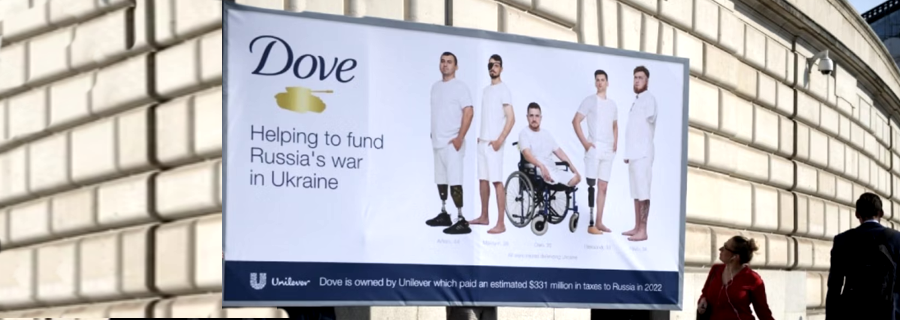Numerous international brewing and drinks companies are concerned about being labeled as international supporters of war by the Ukrainian government due to their reluctance to withdraw business from Russia. This comes as Ukraine's government is actively opposing companies that fail to take a firm stance against involvement in Russia.
On Monday, the Ukraine Solidarity Project organized protests against Unilever, adding it to a list of 'sponsors of war' alongside Procter & Gamble and the French supermarket group Leroy Merlin. This development followed the disclosure that Unilever had paid USD 331 million in taxes to Moscow last year.
Approximately 17 months ago, when the war in Ukraine commenced, several companies chose to shut down their operations in Russia. However, Unilever decided to downsize and currently focuses on selling "essential" products such as shampoo, tea and ice cream. As the protests started this week, there has been a growing demand for Unilever's newly appointed CEO, Hein Schumacher, to withdraw from Russia.
Despite the ongoing war, Unilever has succeeded in doubling its profits by operating through its local Russian business, Unilever Rus. According to the Dutch investigative group Follow the Money, Unilever's profits surged to RUB 9.2 billion (about USD 100 million) last year, doubling their previous figures. Additionally, the company increased its advertising expenditure by 10% to 21.7 billion roubles.
According to the BBC, Unilever argued that exiting Russia is not easy. The business could be seized or taken over by the Russian government. They claimed they have not found a way to sell the business in a manner that "the Russian state cannot derive any further benefit from it and our employees are protected." Therefore, continuing the business under "strict conditions" is considered the best course of action under the given circumstances.
Indeed, it can be challenging for Western companies to withdraw from Russia altogether. The Kremlin, at times, puts pressure on companies through intelligence methods to keep their investments in the country. Furthermore, there have been recent revelations about plans to seize "misbehaving" Western companies in Russia and sell their assets at a low price.
Of all the international brewing companies that had their own production facilities in Russia before Russia's attack on Ukraine, only Carlsberg has managed to terminate its operations on-site. However, even the Danish brewing company signed a contract with an as-yet-unnamed buyer just under two weeks ago. (inside.beer, 23.6.2023)
AB InBev, which has a joint venture with the Turkish brewer Efes, who does not wish to limit its operations in Russia, and Heineken have so far failed to live up to their promises of leaving Russia after February 2022, with only a few actions taken.
In March, Heineken admitted that instead of downsizing the business, the company hired 243 new employees in 2022, a net increase of 20 from the previous year. “New hires were needed to keep the business operational due to employees leaving and to undertake tasks that were previously done at the global headquarters but now must be done locally in preparation for transfer to a new owner,” Heineken said at that time. (inside.beer, 6.3.2023)

